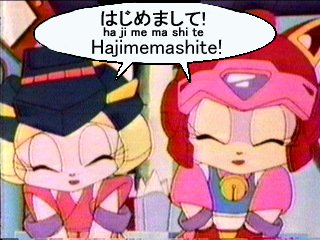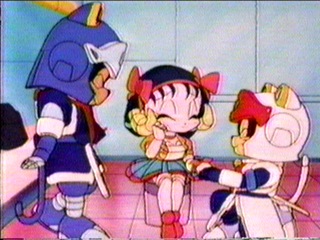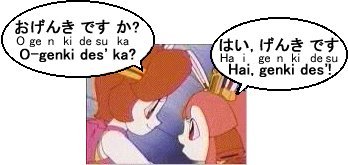 So, now you've learned the basics of Hellos and Good-byes, now we'll take on a couple of slightly more difficult ones, but don't worry, it's not that hard, you can do it!
So, now you've learned the basics of Hellos and Good-byes, now we'll take on a couple of slightly more difficult ones, but don't worry, it's not that hard, you can do it!
All right, you should have a head start on this lesson, because I bet most of you already know 2 of these already, which you've probably picked up as: "Konnichiwa" and "Sayonara".
In hiragana, it's actually spelled "Ko-n-ni-chi ha". A lot of people forget that "n". Pronounce it like "Koan-neechee-wha". (The "ha" kana sounds like "wa" in this case. I'm not sure why they don't just use "wa", it's kind of confusing to non-Japanese, but, English is even more confusing to non-English speakers. Anyway, you'll see "wa" written as "ha" alot, we'll get into that later.) "Konnichi wa" is used like "Good day". In the evening, you say "konban wa" (Good Evening). In the morning, it's "ohaiyou gozaimasu" (Sounds like "Ohio Gozaimas", that last "u" is not really pronounced") which means "Good Morning". Sometimes this is shortened to just "Ohaiyo'" (I'm leaving off that silent "u" to make it simple). When answering the telephone, you say "moshi-moshi"
.
Think you have those memorized now?
Konnichi wa = Good Day
Konban wa = Good Evening
Ohaiyo' Gozaimas' = Good Morning
Moshi-moshi = Hello (on the phone)
Sayonara: That one is easy. I think you can even find it in some English dictionaries since this Japanese word for "good-bye" has made it into common usage, just like the Spanish "adios". My anime-fan friends like to show that they know a little more Japanese than the average American 10 year old, so instead of "sayonara", they like to say "Ja ne" (pronounced: "jya neh") which is a less formal "see ya" type good-bye. Just like English speakers use "Sayonara" sometimes, Japanese also say "Bye-bye", but as "Bai-bai". (Also popular with the more trendy anime fans). When someone is turning in for the night, you can wish them "oyasumi nasai" (O-ya-sue-mee Na-sai) "Good rest", used like our "Good Night".
Lets review:
Sayonara = Goodbye
Ja ne = See ya
Bai Bai = (English) Bye Bye
Oyasumi Nasai = Good Night
 So, now you've learned the basics of Hellos and Good-byes, now we'll take on a couple of slightly more difficult ones, but don't worry, it's not that hard, you can do it!
So, now you've learned the basics of Hellos and Good-byes, now we'll take on a couple of slightly more difficult ones, but don't worry, it's not that hard, you can do it!
When you are introduced to someone, you can say "Hajimemashite" (Ha-ji-meh-ma-shee-teh") "We meet for the first time", used sort of like "Pleased to meet you" in English. It's a long word, just try saying it slow a few times until you get used to it.
"O-genki desu ka?" (O gen-kee Des Kah) is used like the English "How are you?" The "O" in front of a word means it's important, honorable. In Pizza Cats, you may have noticed the big flag on the palace. It says "O-Edo" (Edoropolis, the name of the city), because, of course, Edoropolis is important to the people who live there! "Genki" means sprit and health; your well being. That's important. "Desu" (Des': There's that silent "u" again!) is kind of hard to translate. It means that something "is", "is, are, was, were, will be, exists". "Ka" shows that a question is being asked. The question mark "?" didn't exist in Japan until it was brought in with the Roman (Romaji) Alphabet. It's fairly common to see it used in Japan now, but it's the "Ka" that tells a Japanese that a question is being asked. So: "O-genki des' ka" = "Well-being is?" = "How are you?".

"Hai, genki des'!" ("Hai" = Yes) "Yes, the well-being is (exists)!" = "I'm well". You don't say "O-genki", adding the "O" when you are talking about yourself would make you seem very arrogant to a Japanese! We'll talk more about manners in our next lesson.